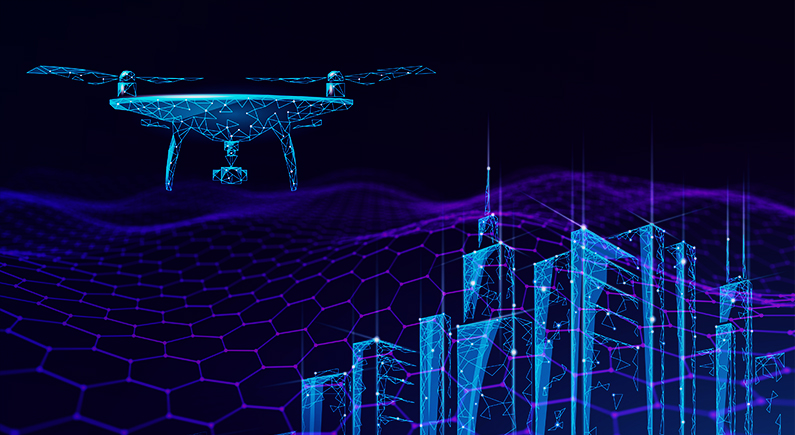Clear the skies: Blockchain, AI and drone management

The intersection of two growing emerging technologies, Blockchain and unmanned drones, has the potential to be a match made in Heaven. The digital advantages of Blockchain could allow for scalable networks of drones while the physical convenience and usage of drones could provide the Blockchain sector with a critical use-case. Combined with AI, drone management may have its future foundation placed firmly in Deep Tech.
The future of Blockchain drone management
Predictions by some of the leading advisory firms such as PwC have noted that the nascent drone industry has the potential to form a vital pillar for the logistics chains of the future. Current iterations of drone policy plan to dedicate a sub-layer of the sky specifically for the usage of drones. Located beneath the airspace used by commercial and military vehicles, these devices could start being used for everything from delivering cargo, ferrying people and even inspecting infrastructure such as bridges and wind turbines. With gravity being what it is, a good drone management system would go a long way towards stopping drones from colliding with each other and, subsequently, with the head of an unlucky passerby.
To this end, Blockchain drone management and artificial intelligence could lay the foundation for a future sublayer of air traffic control. Due to a number of competitive advantages in terms of safety, reliability, cybersecurity and interoperability, Cranfield researchers have noted that a Blockchain-based ecosystem of crewed and uncrewed aircraft could be the way to go for the experimental system.
Drones: the £42 billion economy of Tomorrow
These very same researchers noted how an efficient and future-proofed system of air traffic management could lay the foundation for a brand new economic sector that enhances several other industries.
“open up a new age of commercial opportunities for the aviation sector, as well as drone-enhanced public services: urban air taxis, cargo and delivery services, security operations, healthcare support and environmental monitoring.”
Further research from PwC and UKRI have noted that the general estimation for the future autonomous aviation industry could stand at around £42 billion for just the United Kingdom by 2030 with a hybrid airspace expected to come into effect around 2024.
Why an automated Blockchain-based drone management system?
This future of Blockchain-based drone management is already being pioneered by a consortium of 13 different leading partners in the logistics and deep tech space. Some of these partners include Cranfield, Oxford University, IAG, NATS, SITA and Heathrow Airport as well as a number of UK-based startups.
Cranfield noted that the main advantage afforded to a Blockchain based system would be that of scalability.
“As drones fly over us, the system will allow thousands of independent computers to share the history of data – of who did what and when. The system includes ‘smart contracts’, controls over user actions backed up by coded security. Artificial Intelligence will enhance cybersecurity measures for the DLTs, allowing for constant real-time data collection, processing and authorization during operations.”
The CEO of SITA, a leading firm in terms of IT and air traffic communication, elaborated that
“Through this research partnership we are confident that using DLTs will improve the flow of actionable data between transportation stakeholders to support the efficient and safe operation of unmanned aircraft in future.”
It would be interesting to note that SITA has already used DLT-based IT systems in the tracking of aircraft parts and the sharing of operational data.
AI and drone management:
In terms of automation, the ability to utilize the latest in machine learning and artificial intelligence to action the data provided by the DLT-based database may serve as a vital part of this nascent ecosystem. Dr. Dimitrios Panagiotakopoulos, Senior Lecturer in Uncrewed Aircraft Systems Traffic Management at Cranfield , elaborated how that only automation could allow the sheer volume of a scaled drone economy to be meaningfully used and administered.
“The current approach isn’t scalable to meet the needs of a more complex and demanding hybrid airspace of crewed and uncrewed traffic. To access the huge potential benefits of a new kind of airspace there has to be more automation and autonomy – but that can only happen with watertight systems and a shared sense of trust.”
Gokhan Inalhan, the Professor of Autonomous Systems and Artificial Intelligence at Cranfield, noted how the potential for drone-based economy was just in the process of being unlocked.
“This is a very exciting project and one that will pave the way for highways in the skies, removing traffic and congestion and changing the way we move around.”
Information sourced from Beincrypto.com
Join us in Belgrade, Serbia from the 22-25th August:
With the peninsula being known for its natural beauty, rich cultural landscape and fantastic delicacies, the Balkans are renowned for having some of the most quintessentially Mediterranean vistas and experiences. From the Adriatic coastline of Split to the fairytale-esque castle of Lake Bled, the region has a lot to offer the world. This being said, something that fewer may know is the fact that the nations of the Balkans are incubating a nascent but powerfully growing technical expertise when it comes to frontier technology such as Blockchain, GameFi, AI and more. Therefore the region may not only be a rich adventure into the past but my also serve as a window into the very near future.
Join us in Belgrade for the best the industry has to offer and for a window into the future of Deep Tech. To learn more about sponsorship and speaking opportunities or to inquire about attending the event, please contact Sophie at [email protected]






